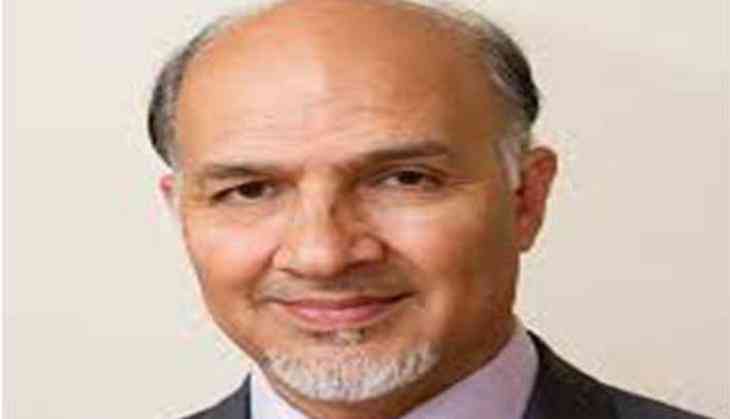
Afghanistan's Permanent Representative to the United Nations has squarely blamed Pakistan for perpetrating a wave of terror in his country, and urged the international community to urgently take steps to eliminate "support centers beyond our frontiers that produce, nurture, and empower terrorists operating in Afghanistan".
Participating in a United Nations Security Council (UNSC) debate on the prevailing situation in Afghanistan recently, Ambassador Mahmoud Saikal said, "Through selective targeting and careful allocation of responsibility claims for terrorist attacks, the handlers of terrorism in the neighborhood (read Pakistan) seek to create discord and distrust between our people and security forces."
He added, "The enemy is doing its best to stage so called "Green on Blue" attacks in order to undermine international training programs and support of our security forces.. We will leave no room for any possible enemy infiltrators in our security forces."
Ambassador Saikal further stated that the recently released outcome of a joint investigation by Afghanistan, United Arab Emirates and United States clearly established that the January 10 Kandahar attack was planned in Quetta, Pakistan.
"Similarly, early investigations verified the link between the Kabul truck bombing of May 31 and the Haqqani Network based in Pakistan. A joint Afghan-German comprehensive investigation on the attack is currently underway. We shall release the outcome in due course," he said.
"The other external threat to Afghan sovereignty is the number of cross-frontier violations, which have increased dramatically - almost four-fold - since my last March presentation to this Council," he added.
"These violations, ranging from firing of artillery shells, air-space violations, construction of military posts and barriers, to digging of deep ditches - all of which exacerbate the current situation, if left unaddressed, will undoubtedly continue to undermine peace and security in our region," he said.
Ambassador Saikal was categorical in naming and blaming the Government of Pakistan for saying that the Government of Afghanistan "should not externalize its internal problems and blame others for its own failures."
He said, "It is the same state that has been highly determined to do everything possible at its disposal to weaken and destabilize our country while accusing us of weakness. Let me remind everyone that those who want to attribute Afghanistan's security and other challenges solely to internal issues are doing so to detract focus and attention on their long-standing policy of propagating violence and disorder in our country."
He said that Afghanistan is pursuing a three-pronged strategy: 1) Strengthening global counter-terrorism consensus with a focus on engaging Pakistan in genuine cooperation, ending cross-frontier violations and facilitating the peace process; 2) Strengthening our security and defensive capabilities and 3) Improving national unity, governance and service delivery to our people.
"Given the nature of the conflict, the success of our strategy depends on collaborative and sustained work at national, regional and global levels," Ambassador Saikal said.
Afghanistan, he said, has welcomed the creation of the UN Office for Counter Terrorism and expressed the hope that its activities and mandate will help to bring about a real and tangible change in counter terrorism efforts on its soil as well as elsewhere.
"Today, the world faces an enemy united in its sole desire to bring death and destruction, dismantle state institutions, and create chaos. Hence, it is imperative that the UN acts decisively on its mandate - to maintain international peace and security."
He further stated that Afghanistan has reiterated time and again two of its key concerns: 1) concrete action against regional safe havens and logistical support to terrorists; and 2) cross frontier violations, which I referred to before.
"On both issues, we have provided full briefings to the Secretary General and the UNSC. The UNSC is yet to take necessary and appropriate actions to address these two concerning issues. In our view, had it done so in the past, the situation would be different today," Ambassador Saikal added.
He again appealed to the UNSC to act, strictly enforce and strengthen the sanctions regimes.
He insisted that the Taliban, which he described as an "irreconcilable" force should be recognized as a terrorist group after their failure to engage meaningfully in peace talks.
"Also, the UN must specify concrete criteria to clearly define state sponsorship of terrorism," he added.
Ambassador Saikal said that Afghanistan is grateful that the UNSC initiated a review of the United Nations Assistance Mission in Afghanistan's (UNAMA's) structure, resources, and activities to ensure a more efficient and effective UN support role in the country.
Saying that failure was not an option insofar as counter-terrorism measures are concerned, the Afghanistan envoy said challenges would continue to emerge and would have to be confronted with the support of the international community, including the UNSC, to ensure success.
Expressing his government's appreciation over U.N. Secretary-General Antonio Guterres' visit to Kabul last week, Ambassador Saikal described it as a "strong sign of his personal commitment to peace and security in our country, for which we are deeply grateful."
"In the broader context, his (Guterres) visit reaffirmed that the UN would remain beside us over the coming years as we continue our journey towards prosperity," he added.
"Today, as we stand at a cross-road in our stabilization efforts, we look up to you to help us overcome our security challenges by confronting the source of the ongoing conflict and not dealing with the consequences. In this connection, the need of an appropriate response by this Council to the task at hand cannot be overstated. We hope this is realized so that our people are able to meet their basic aspiration of living in peace and security - free of terror, violence and destruction," he said.
-ANI


